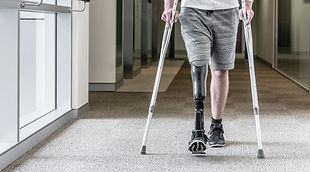

Knee Pain
Home Physio specializes in diagnosing and carefully treating Knee Pain while making sure each patient is fully informed throughout the process. Serving the Central, West & North London , Home Physio is known for delivering outstanding results while helping you minimize your personal investment and creating a suitable treatment plan for your needs.
Home / Conditions / Knee Pain

What Is Causing Your Knee Pain?
Knee pain or knee injuries are widespread, and there are many causes. It is crucial to make an accurate diagnosis of the reason from a thorough assessment. It would be best if you directed appropriate treatment at the origin. Knee pain can arise from soft tissue injuries (e.g. ligament sprains and muscle strains), bone conditions (e.g. osteoarthritis, Osgood Schlatters Disease) and biomechanical dysfunction (e.g. Patellofemoral syndrome). Your sciatic nerve can even refer to your knee.
Knee pain has many causes, and treatment varies considerably depending on the diagnosis. Treatment may involve simple knee mobilisation techniques, massage, taping, stretches or strengthening exercises. Thorough rehabilitation protocols post-knee reconstruction or knee replacement surgeries provide excellent outcomes.

How Do You Know If Your Knee Injury Is Serious?
While it is always best to seek the professional advice of a highly skilled practitioner trained in knee injuries, such as your doctor or physiotherapist, here are seven signs that could indicate a severe knee injury.
-
Obvious deformity. You may have a fracture or dislocation.
-
You heard a “pop” or “snap”.
-
You’ve experienced swelling.
-
Greater than normal movement
-
Less than usual movement, e.g. can’t straighten
-
You are unable to weight-bear on your leg
-
Your knee “gives way” or “buckles”.

What is the Best Exercise for Knee Pain?
It may seem a little contradictory, but researchers have identified that knee exercises may assist in the relief of your knee pain. The vital thing to determine is which knee exercises are likely to help you, which could be harmful.
What exercise dosage you should be doing is also important. Your exercise dosage will vary depending upon your specific diagnosis, injury phase, and other individual health factors. Your physiotherapist’s professional training will guide you quickly back to pain-free knees.
While we’d like to say that all knee exercises are beneficial to you, there are significant individual differences between all patients who present with knee pain. For example, an older diabetic or overweight patient will require a very different set of knee exercises from a young high-performance athlete or a patient who has just had knee surgery.
Based on the significant individual differences between patients with knee pain, your knee treatment can differ from someone else with a similar issue. Seek the professional advice of your trusted physiotherapist or healthcare practitioner who has a particular interest in knee pain and injuries to guide your knee rehabilitation.
_edited.png)





